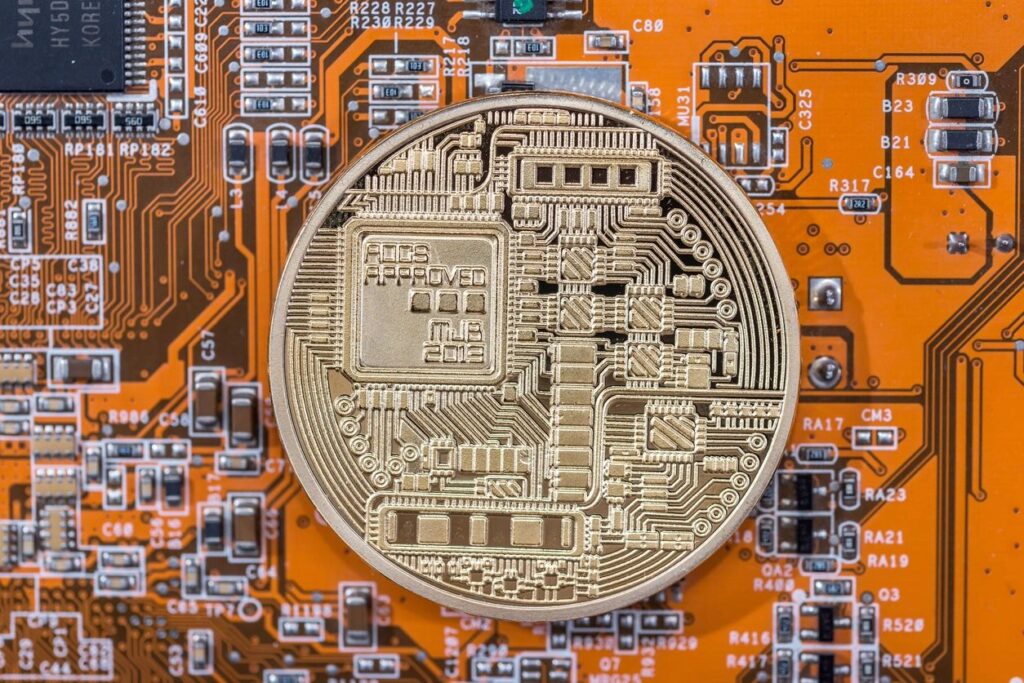To Share is to Show You Care!
In the ever-evolving landscape of digital data, concerns about privacy have reached a critical juncture. As we navigate the intricate web of online transactions, social media interactions, and sensitive information sharing, it becomes paramount to explore revolutionary solutions. Enter blockchain technology, the game-changer in safeguarding your personal data.
1. The Rise of Blockchain: A Paradigm Shift in Privacy
In the rapidly evolving landscape of digital interactions, the rise of blockchain technology signifies a paradigm shift in how we approach and safeguard privacy. Understanding the intricacies of this shift is crucial in appreciating the potential of blockchain to address contemporary privacy concerns. Here’s a detailed exploration of the key points:
1.1 Decentralization: Shifting Power to the User

Traditional systems rely on centralized entities, such as banks or social media platforms, to manage and authenticate transactions. Blockchain, however, operates on a decentralized network of computers, commonly known as nodes. Each node holds a copy of the entire blockchain, and no single entity has control over the entire network. This decentralized architecture not only removes the need for intermediaries but also eliminates the vulnerability associated with a central point of failure. In the context of privacy, decentralization means that your data is not stored in a single, hackable location; rather, it is distributed across a network, making it significantly more secure.
1.2 Immutability: Your Data, Your Control
Immutability in the context of blockchain refers to the unalterable nature of data once it is recorded on the blockchain. Each block in the chain contains a cryptographic hash of the previous block, creating a chain of blocks that is resistant to tampering. Once your data is added to the blockchain, it cannot be changed or deleted. This feature ensures the integrity and permanence of your information, giving you unprecedented control over your personal data. In a world where data manipulation is a growing concern, the immutability of blockchain provides a powerful solution to protect against unauthorized alterations.

1.3 Smart Contracts: Enforcing Privacy Automatically

Smart contracts are self-executing contracts with the terms of the agreement directly written into code. These contracts automatically execute and enforce predefined conditions when the specified criteria are met. In the context of privacy, smart contracts play a crucial role in automating processes while ensuring data confidentiality. For instance, a smart contract can facilitate a transaction without revealing sensitive details to the parties involved. This not only streamlines operations but also minimizes the need for intermediaries, reducing the risk of data exposure. Smart contracts are a cornerstone in the blockchain’s ability to offer privacy by design.
Understanding these fundamental aspects of blockchain technology provides insight into why it is considered a revolutionary force in addressing privacy concerns. The decentralized nature, immutability, and smart contract functionality collectively contribute to a paradigm shift in how we approach and ensure privacy in the digital age.
2. How Blockchain Addresses Privacy Concerns in 2023
As we step into the future, blockchain technology is poised to redefine privacy. Here’s a closer look at its role in addressing contemporary concerns:

2.1 Enhanced Security Measures
Blockchain employs advanced cryptographic techniques to secure transactions and data. This significantly reduces the risk of data breaches and unauthorized access. The cryptographic nature of blockchain ensures that each transaction is securely recorded, and the decentralized network makes it challenging for malicious actors to compromise the system.
2.2 User Anonymity
Blockchain transactions can be conducted pseudonymously, providing a level of anonymity not found in traditional systems. Each user is represented by a cryptographic address, allowing them to engage in transactions without revealing their identity. While not entirely anonymous, this pseudonymous nature adds a layer of privacy, making it more challenging to trace transactions back to specific individuals.
2.3 Permissioned Blockchains: Control Access
In certain scenarios, permissioned blockchains allow entities to control access to data. This ensures that sensitive information is only shared with authorized parties, adding an extra layer of protection. With permissioned blockchains, organizations can define who has access to specific data, reducing the risk of unauthorized exposure. This controlled access enhances privacy, especially in sectors where data confidentiality is paramount.
2.4 Consensus Mechanisms: Ensuring Data Integrity
Blockchain relies on consensus mechanisms like Proof of Work (PoW) or Proof of Stake (PoS) to validate transactions. These mechanisms not only secure the network but also ensure the integrity of the data. Transactions are verified by a majority of participants, making it extremely difficult for any single entity to manipulate or alter the data. This consensus-driven approach adds an extra layer of trust and integrity to the information stored on the blockchain.
2.5 Interoperability and Cross-Chain Solutions
In 2023, interoperability between different blockchains is becoming increasingly important. Blockchain networks are working towards creating solutions that allow seamless communication and data transfer between disparate blockchains. This interoperability enhances privacy by providing users with more choices and flexibility in managing their data. Users can leverage multiple blockchains for different purposes, ensuring diversified and secure storage of their information.
CoinSmart
Buying Bitcoin is quick and easy with CoinSmart– The world’s most accessible crypto exchange. Designed for beginners, built for experts. Instant verification, 24/7 support, fully registered, safe and secure.

Here are five potential reasons someone might consider subscribing to CoinSmart,
User-Friendly Interface
Positive reviews often highlight an intuitive and user-friendly interface on CoinSmart. A platform that is easy to navigate can be especially appealing to beginners in the crypto space.
Variety of Cryptocurrencies
Customers may appreciate the platform’s diverse selection of cryptocurrencies for buying and selling. A broad range of available assets allows users to explore different investment opportunities.
Security Features
If CoinSmart has robust security measures, customers are likely to praise the platform for prioritizing the safety of their funds and personal information. Features such as two-factor authentication and cold storage for digital assets contribute to a secure trading environment.
Educational Resources
Positive reviews might mention the availability of educational resources on the CoinSmart platform. Informative materials, tutorials, or customer support can help users, especially those new to crypto trading, make informed decisions.
Responsive Customer Support
Excellent customer support is a key factor in positive reviews. If CoinSmart provides responsive and helpful support, users are more likely to feel confident using the platform, knowing that assistance is available when needed.
It’s crucial to conduct your own research and check the latest customer reviews to ensure that CoinSmart continues to meet the expectations of users. Additionally, consider factors such as fees, transaction speed, and any unique features offered by the platform.
Conclusion: Embrace the Future of Privacy with Blockchain
The era of compromising privacy in the digital realm may be drawing to a close. Blockchain technology, with its decentralized nature, immutability, innovative features, consensus mechanisms, and interoperability, is the beacon guiding us towards a more secure and private digital future.
As we navigate the intricacies of data privacy in 2023, embracing blockchain is not just an option; it’s a necessity. Stay ahead of the curve, protect your data, and witness the revolution unfold before your eyes.
Frequently Asked Questions
Q1: What are the privacy concerns of blockchain?
A: Blockchain, despite its innovative features, raises several privacy concerns. The transparency inherent in public blockchains means that transaction details are visible to all participants, potentially compromising user privacy. Additionally, the pseudonymous nature of blockchain addresses doesn’t guarantee complete anonymity, and sophisticated analysis techniques can potentially reveal the identities of users.
Q2: What is the problem with private blockchains?
A: While private blockchains offer enhanced control and privacy compared to public counterparts, they face challenges. The centralized nature of private blockchains means that a single entity often controls the network, raising questions about decentralization and trust. Moreover, the closed nature of private blockchains limits transparency, hindering the potential benefits of a fully open and decentralized system.
Q3: What are the privacy issues with Bitcoin?
A: Bitcoin, as a public blockchain, faces privacy issues due to its transparent ledger. Transaction details are accessible to anyone, leading to potential concerns about the traceability of funds and the exposure of financial information. While addresses are pseudonymous, they are not entirely anonymous, and certain transactions may be linked to real-world identities through various analysis methods.
Q4: What are the major problems with blockchain?
A: Blockchain technology, despite its advantages, has its challenges. Scalability remains a major concern, with some blockchains struggling to handle a large number of transactions efficiently. Energy consumption in proof-of-work blockchains, interoperability issues between different blockchains, and regulatory uncertainties also pose significant challenges to widespread blockchain adoption.
Q5: What is the biggest risk of blockchain?
A: The decentralization that makes blockchain secure is also its potential risk. While decentralization enhances security by eliminating a single point of failure, it can lead to challenges in governance and coordination. Disagreements within the community, lack of standardization, and the potential for hard forks can pose risks to the stability and continuity of blockchain networks.
Q6: Does blockchain have privacy?
A: Blockchain inherently offers a degree of privacy, especially through features like cryptographic security, immutability, and pseudonymity. However, the level of privacy varies depending on the type of blockchain. Public blockchains, like Bitcoin, may have transparency concerns, while private blockchains provide more control but sacrifice some aspects of decentralization.
Q7: What are the three dilemmas of blockchain?
A: The three dilemmas of blockchain often revolve around the trade-offs between decentralization, scalability, and security. Achieving high levels of all three simultaneously is challenging. As decentralization increases, scalability and speed may suffer, and implementing security measures can also impact scalability. Striking the right balance among these dilemmas is a constant challenge in blockchain development.
Q8: Why is blockchain risky?
A: Blockchain carries risks due to its evolving nature and the potential for unexpected consequences. Rapid technological advancements, regulatory uncertainties, and the complex governance structures of some blockchain projects contribute to the risk. Additionally, security vulnerabilities, potential for misuse, and market volatility in blockchain-based assets add to the overall risk profile.
Q9: What are the pros and cons of private blockchain?
A: Private blockchains offer advantages like increased control, enhanced privacy, and faster transaction processing. However, they come with downsides, such as centralization concerns, reduced transparency, and potential resistance to adoption due to the closed nature of the network. Striking a balance between control and decentralization is crucial when considering the pros and cons of private blockchains.
Q10: How does blockchain increase privacy?
A: Blockchain enhances privacy through its cryptographic features, decentralized structure, and immutability. The use of private keys and public addresses adds a layer of security to transactions. Decentralization eliminates the need for a central authority, reducing the risk of data breaches. Immutability ensures that once data is recorded, it cannot be altered, providing users with greater control over their information.
Q11: How does blockchain support data privacy?
A: Blockchain supports data privacy by decentralizing control, securing transactions with cryptography, and ensuring the integrity of recorded data. Through features like smart contracts, users can automate processes while maintaining confidentiality. The distributed nature of blockchain reduces the risk of a single point of failure, contributing to a more secure environment for sensitive data.
Q12: What is privacy in cryptocurrency?
A: Privacy in cryptocurrency refers to the ability of users to protect their personal information and transaction details. While cryptocurrencies like Bitcoin offer pseudonymity, meaning transactions are linked to cryptographic addresses rather than real-world identities, achieving complete privacy is challenging. Privacy-focused cryptocurrencies use advanced techniques like ring signatures and stealth addresses to enhance user anonymity.
Q13: What are the five key challenges to blockchain?
A: Five key challenges to blockchain include scalability issues, energy consumption concerns in proof-of-work systems, interoperability challenges between different blockchains, regulatory uncertainties, and potential security vulnerabilities. Addressing these challenges is crucial for the widespread adoption and success of blockchain technology.
Q14: Is blockchain having issues today?
A: As of my last knowledge update in January 2022, blockchain technology continues to evolve, and various projects face ongoing challenges. Issues such as scalability, regulatory developments, and security concerns persist, but the dynamic nature of the blockchain space means that these challenges are actively being addressed by developers, researchers, and the broader community. For the latest information, it’s advisable to check current sources and updates in the blockchain industry.
The Informed Minds
I'm Vijay Kumar, a consultant with 20+ years of experience specializing in Home, Lifestyle, and Technology. From DIY and Home Improvement to Interior Design and Personal Finance, I've worked with diverse clients, offering tailored solutions to their needs. Through this blog, I share my expertise, providing valuable insights and practical advice for free. Together, let's make our homes better and embrace the latest in lifestyle and technology for a brighter future.

